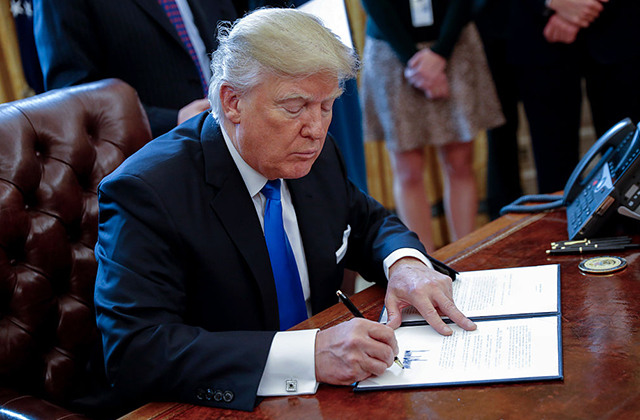President Donald Trump has signed executive orders in the Oval Office this morning (January 24) pushing through the Keystone XL and Dakota Access pipelines, as seen in the CNN video above.
He promised throughout his candidacy that he’d take such actions. The president signed three other executive orders that will expedite environmental reviews on "high priority infrastructure projects." Still, environmentalists remain determined to prevent both projects from moving forward. Environmental and Indigenous groups are already gearing up—and so are Nebraska Republican landowners opposed to the project, according to Politico.
In an emailed statement, Greenpeace Executive Director Annie Leonard wrote:
“A powerful alliance of Indigenous communities, ranchers, farmers, and climate activists stopped the Keystone and the Dakota Access pipelines the first time around, and the same alliances will come together to stop them again if Trump tries to raise them from the dead. Instead of pushing bogus claims about the potential of pipelines to create jobs, Trump should focus his efforts on the clean energy sector where America’s future lives. Trump’s energy plan is more of the same—full of giveaways to his fossil fuel cronies at a time when renewable energy is surging ahead.”
The Indigenous Environmental Network issued a statement too:
These actions by President Trump are insane and extreme, and nothing short of attacks on our ancestral homelands as Indigenous peoples. The executive orders demonstrate that this administration is more than willing to violate federal law that is meant to protect Indigenous rights, human rights, the environment and the overall safety of communities for the benefit of the fossil fuel industry. These attacks will not be ignored, our resistance is stronger now than ever before and we are prepared to push back at any reckless decision made by this administration
This is the administration’s latest move on environmental issues: The EPA leaked to press last night that agency grants and contracts were frozen until further notice. “All of our worst fears about the Trump presidency are being confirmed this week,” wrote Food & Water Watch Executive Director Wenonah Hauter, in an emailed statement.
It’s still unclear how the administration plans to revive Keystone XL and secure Dakota Access. Politico reports that Trump could “undo a 2004 George W. Bush administration order that requires a broad inter-agency review led by the State Department of cross-border pipeline projects.” CNBC writes that the orders will "make it easier" for pipeline companies TransCanada and Energy Transfer Partners to finish construction on their respective pipelines.
In related developments, the Water Protector Legal Collective continues to build its case against the Morton County Sheriff’s Department for its actions on the eve of November 21, when officers allegedly used excessive force against water protectors contesting the Dakota Access Pipeline at Standing Rock through water cannons, tear gas, rubber bullets and more.
Attorneys filed new paperwork yesterday (January 23) with the class action lawsuit the collective launched November 28, Dundon v. Kirchmeier, over the alleged police violence. The new papers include a declaration from Commissioner Thomas C. Frazier. He is the former commissioner of the Baltimore Police Department and conducted independent investigations for the Department of Justice into how law enforcement responded to escalated demonstrations in Ferguson, Missouri, and Oakland, California.
The commissioner defends the water protectors in his declaration and criticizes the actions of law enforcement.
In his declaration, he wrote:
“I have never seen, in any other American city or county, the use of water hoses or a water cannon against a United States citizen for any reason although I have read about this occurring in the early 1960s against civil rights marchers. The brute force of the impact of the water jet is a force option that would not be considered appropriate by most modern police chiefs or sheriffs, or tolerated by their citizenry. In this case, the use of this device in sub-freezing temperatures, in my opinion, serves no reasonable purpose and can only be considered a retaliatory and punitive action. Not only can the water jet cause injury when applied at such short range, but the water was also subsequently sprayed in a wide arc and far behind protestor lines, seemingly to get as many protestors wet as possible. The video evidence shows indiscriminate use of the water on peaceful protesters who were not being aggressive towards the police. In the sub-freezing weather, its use was certain to cause hypothermia, which it did. It was reported that approximately two dozen people were hospitalized for hypothermia on the night in question. This was an obvious and predictable outcome of the use of the water jet. Further, it was clearly intentional, and unnecessary on the part of the law enforcement decision makers.”
#NoDAPL water protectors continue to seek justice for the actions of the Morton County Sheriff’s Department. Yesterday they testified before the United Nations Working Group on Human Rights, Transnational Corporations and Other Business Enterprises against the department’s alleged human rights abuses. Readers can watch the three-hour long hearing on YouTube here.
